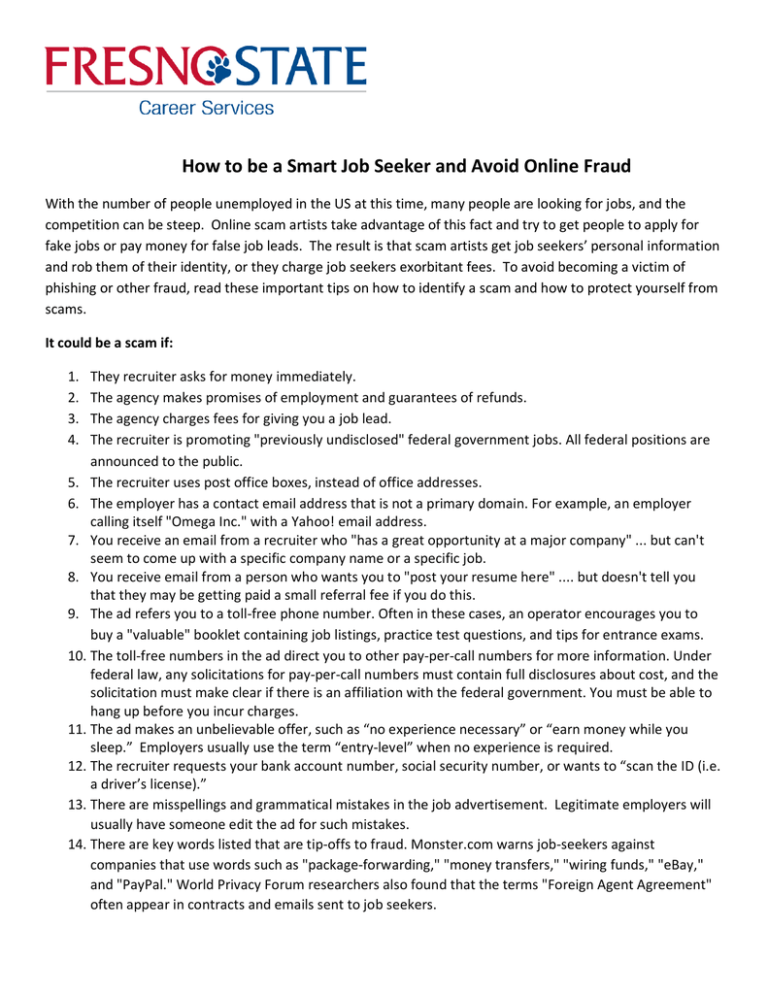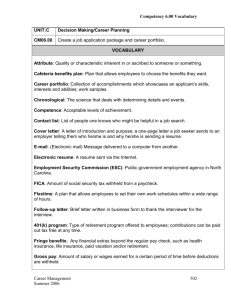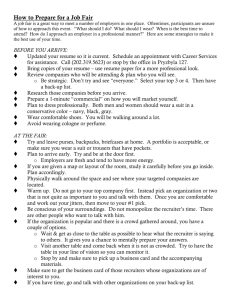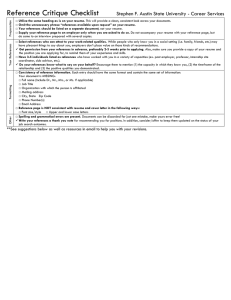How to be a Smart Job Seeker and Avoid Online...
advertisement

How to be a Smart Job Seeker and Avoid Online Fraud With the number of people unemployed in the US at this time, many people are looking for jobs, and the competition can be steep. Online scam artists take advantage of this fact and try to get people to apply for fake jobs or pay money for false job leads. The result is that scam artists get job seekers’ personal information and rob them of their identity, or they charge job seekers exorbitant fees. To avoid becoming a victim of phishing or other fraud, read these important tips on how to identify a scam and how to protect yourself from scams. It could be a scam if: 1. 2. 3. 4. They recruiter asks for money immediately. The agency makes promises of employment and guarantees of refunds. The agency charges fees for giving you a job lead. The recruiter is promoting "previously undisclosed" federal government jobs. All federal positions are announced to the public. 5. The recruiter uses post office boxes, instead of office addresses. 6. The employer has a contact email address that is not a primary domain. For example, an employer calling itself "Omega Inc." with a Yahoo! email address. 7. You receive an email from a recruiter who "has a great opportunity at a major company" ... but can't seem to come up with a specific company name or a specific job. 8. You receive email from a person who wants you to "post your resume here" .... but doesn't tell you that they may be getting paid a small referral fee if you do this. 9. The ad refers you to a toll-free phone number. Often in these cases, an operator encourages you to buy a "valuable" booklet containing job listings, practice test questions, and tips for entrance exams. 10. The toll-free numbers in the ad direct you to other pay-per-call numbers for more information. Under federal law, any solicitations for pay-per-call numbers must contain full disclosures about cost, and the solicitation must make clear if there is an affiliation with the federal government. You must be able to hang up before you incur charges. 11. The ad makes an unbelievable offer, such as “no experience necessary” or “earn money while you sleep.” Employers usually use the term “entry-level” when no experience is required. 12. The recruiter requests your bank account number, social security number, or wants to “scan the ID (i.e. a driver’s license).” 13. There are misspellings and grammatical mistakes in the job advertisement. Legitimate employers will usually have someone edit the ad for such mistakes. 14. There are key words listed that are tip-offs to fraud. Monster.com warns job-seekers against companies that use words such as "package-forwarding," "money transfers," "wiring funds," "eBay," and "PayPal." World Privacy Forum researchers also found that the terms "Foreign Agent Agreement" often appear in contracts and emails sent to job seekers. How to protect yourself from scams: 1. If you post your resume online, make it private. When it comes to resume databases, job search sites put the responsibility on the job seeker to understand the risks involved in posting a resume online. 2. If you are unsure about an employer’s reliability, check with outside sources like the Better Business Bureau (www.bbb.org) or local consumer protection offices. 3. Do not give out your credit card or bank account information over the phone unless you are familiar with the company and agree to pay for something. Anyone who has your account information can use it to take money from your accounts improperly. 4. Unless you are applying to the Federal or State government, never put a Social Security Number on your resume. (See tip #4 in the previous section about legitimate government job posts.) Keep your SSN off of your resume, and be very cautious about emailing it to people who ask for it. You should only give your SSN to an employer after you have fully validated them as a legitimate employer. 5. Follow up with the corporate offices of any company listed in an ad by an employment service, to find out if that company is really hiring. 6. If your resume has been posted online for several months, it is a good idea to just take it down and start over. In the World Privacy Forum year-long Job Search Study, research showed that the best job offers usually came within the first month of the resume being posted. After that, you are more likely to receive illegitimate job offers. 7. If you decide to post your resume to a site, consider using email address that you can cancel if you start getting spam, and don’t give out your full name, phone number, or home address. Use a post office box, and do not give your street address to an employer until you have verified them fully. 8. When you post a resume online, do not include your references in order to protect them from scam artists. 9. School information is tricky. Education is a necessary category on a resume. The problem is that anyone can call up your school and get what is called "directory information" without your consent. This can include your name, date of birth, home address, and other vital information. If you are a current college student, you can sign what is called a FERPA form to stop your school from giving this information out to just anyone. (FERPA stands for Family Educational Rights and Privacy Act.) For information about FERPA at Fresno State, see http://www.csufresno.edu/studentaffairs/programs/ financialaid/parentpages/ ferpa.shtml Sources of the above information: Better Business Bureau (www.bbb.org) Federal Trade Commission (www.ftc.gov) Privacy Rights Clearinghouse (www.privacyrights.org) World Privacy Forum (www.worldprivacyforum.org) Overseas Digest (www.overseasdigest.com) Thomas 103 ● 559.278.2381 ● www.fresnostate.edu/careers ● careerservices@csufresno.edu


